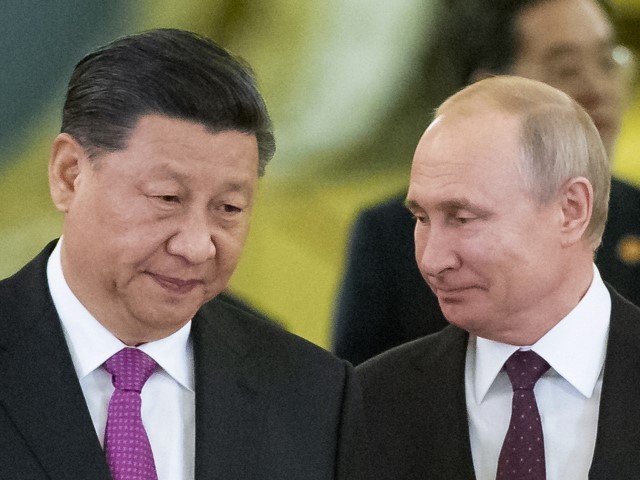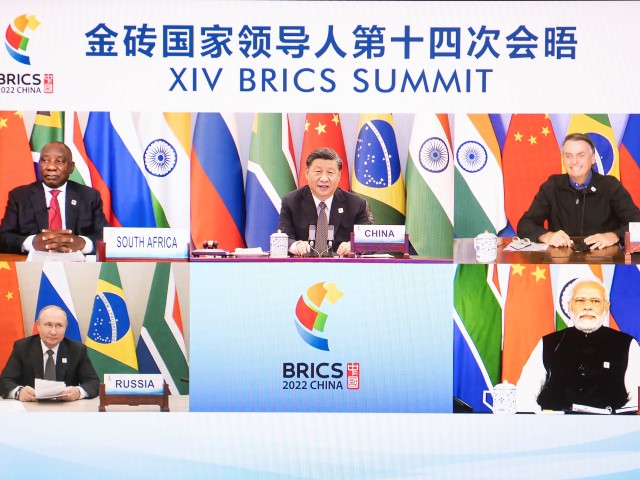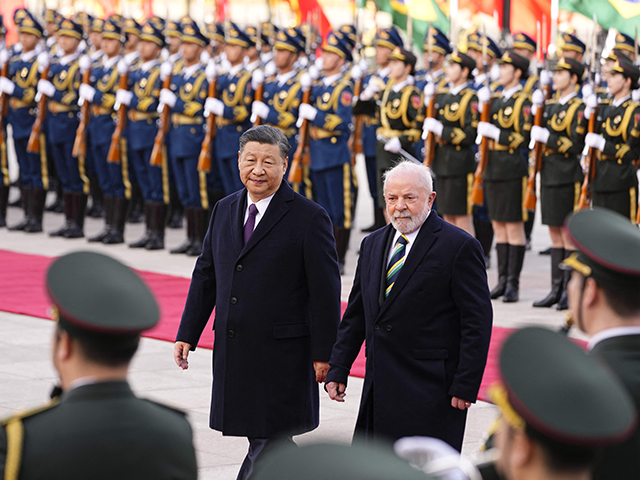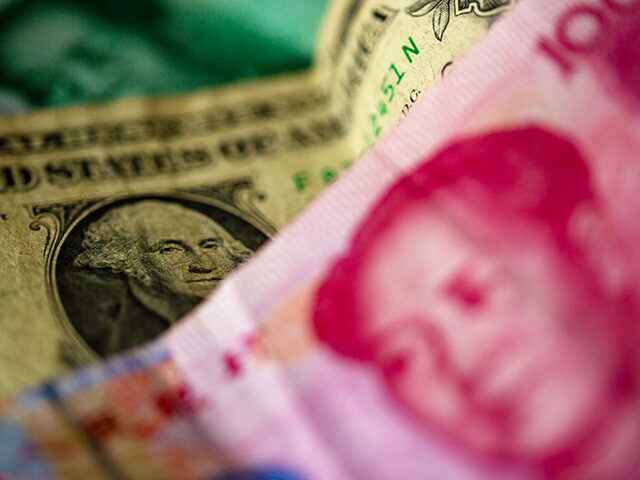The China-led BRICS trade and security bloc will reportedly discuss reducing their reliance on the U.S. dollar for trade during their upcoming South Africa summit — furthering plans to diminish American influence around the world.
The coalition — made up of Brazil, Russia, India, China, and South Africa — will convene on August 22-24 in Johannesburg. The bloc has been seeking to reduce its reliance on the U.S. dollar for more than a decade, succeeding marginally more in those efforts after America and the European Union imposed economic sanctions on Russia in 2022 following its invasion of Ukraine.

Chinese President Xi Jinping, center left, and Russian President Vladimir Putin, center right, enter a hall for talks in the Kremlin in Moscow, Russia, June 5, 2019. (Alexander Zemlianichenko/AP)
The subject of conducting trade with their respective local currencies in favor of the dollar will be among the main topics of the bloc’s agenda. Although BRICS leaders have mulled creating a new currency for the trade bloc, that idea has made little progress, reports indicate, as replacing the dollar with the Chinese yuan or Russian ruble has proven more viable, according to former White House economist Jo Sullivan.
“It [de-dollarization] might work this time because their [BRICS] ambition for an actual currency seems to have scaled down,” Sullivan told the Saudi Al Arabiya television channel on Tuesday. “It is no more this fanciable notion of a shared currency like the Euro, instead they seem to be focusing more on the use of the currency in international trade, which is why it is more seriously a viable possibility.”
RELATED VIDEO — Klobuchar: Russian Rebellion Shows “Crack in the Strength” of Putin at Home:
“The BRICS countries are trying to accelerate the process of reducing their reliance on the dollar,” researcher Mihaela Papa told Al Arabiya. “While Russia has always been committed to de-dollarization due to sanctions-related risks, now we see other countries, especially Brazil, becoming more vocal about acting on this agenda.”
“There needs to be a consensus among BRICS that is economically and politically desirable,” Papa continued. “Any new currency, if they can agree to it, will need to start small, operate in parallel with local currencies and take a long time to become both trusted and global.”

Chinese President Xi Jinping hosts the 14th BRICS Summit via video link in Beijing, capital of China, June 23, 2022. (Li Tao/Xinhua via Getty Images)
While officials from some of the bloc’s member states have made calls for a unified BRICS currency, no concrete information regarding the subject has been publicly announced. Instead, BRICS members have used the Chinese yuan as a replacement currency to counter the U.S. dollar.
Brazil, under the government of radical leftist President Luiz Inácio Lula da Silva, has been one of the bloc’s biggest proponents of doing away with the U.S. dollar, pushing efforts to steer Brazil away from the American currency during the first months of his third presidential term, which began in January.
In March, Brazil signed an agreement with China to use the Brazilian real and Chinese yuan to conduct trade with one another in favor of the U.S. dollar. In April, during his official visit to China, Lula made calls for other BRICS member-states to seek alternatives to the dollar, including the possibility of establishing a new BRICS currency.

Chinese President Xi Jinping (L) and Brazil’s President Luiz Inacio Lula da Silva attend a welcome ceremony at the Great Hall of the People in Beijing on April 14, 2023. (KEN ISHII/POOL/AFP via Getty Images)
“Why can’t an institution like the BRICS bank have a currency to finance trade relations between Brazil and China, between Brazil and all the other BRICS countries?” Lula said in April. “Who decided that the dollar was the currency (for trade) after the end of the gold parity?”
Similar to Lula’s calls for a BRICS currency, Russian Foreign Minister Sergey Lavrov claimed in January that the creation of a BRICS currency would be discussed in the upcoming August summit.
Although Lula and Lavrov made respective calls for a BRICS currency this year, Anil Sooklal, South Africa’s ambassador to the trade bloc, stated in July, “There’s never been talk of a BRICS currency.” Sooklal said that, while the subject of a new currency is “not on the agenda” of the upcoming August summit, the bloc will nonetheless continue to steer away from the U.S dollar.
RELATED VIDEO — Rhodes: China Is “Much More” Aggressive with Spying in Preparation for Possible War:
“What we have said and we continue to deepen is trading in local currencies and settlement in local currencies,” Sooklal told Reuters.
The bloc will reportedly discuss the potential expansion of the group during the summit, including topics such as admission criteria and guiding principles. While China, Russia, and India are keen on the idea of adding new members, reports published last week claim that Brazil remains as the main holdout, allegedly due to concerns that the group will “lose stature” if other nations are let in.
According to Sooklal, more than 40 countries have allegedly expressed their interest in joining BRICS, such as Argentina, Iran, Saudi Arabia, the United Arab Emirates, Cuba, the Democratic Republic of Congo, Comoros, Gabon, and Kazakhstan. Bolivia’s socialist President Luis Arce will also participate in the summit, seeking to attain investment and partnership options that help the nation boost its nascent lithium industry.
Christian K. Caruzo is a Venezuelan writer and documents life under socialism. You can follow him on Twitter here.

COMMENTS
Please let us know if you're having issues with commenting.